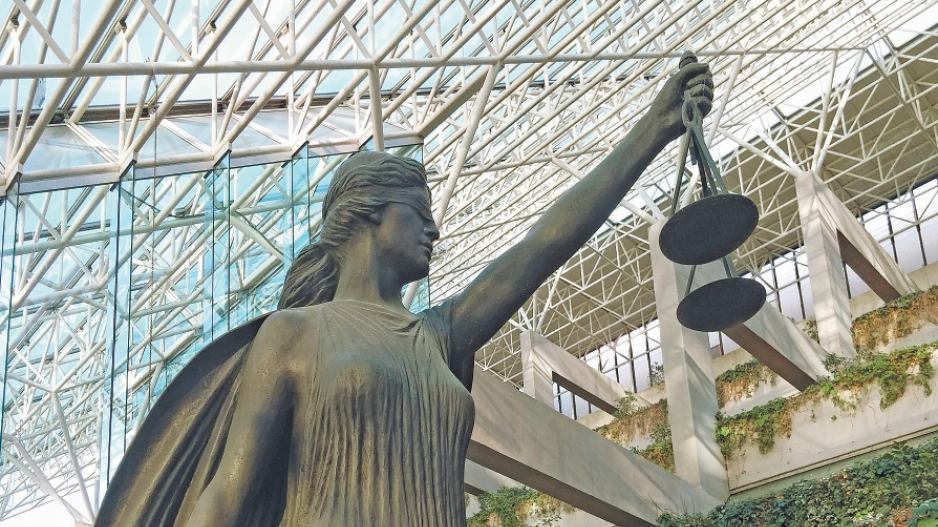After two and a half months of limited operations, certain Provincial Court of BC courtrooms resume in-person proceedings on priority matters this week.
As of Monday, two courtrooms at courthouses in Vancouver, Surrey, Victoria, Prince George and Kelowna are open for urgent matters that cannot be accommodated remotely. An additional 28 courtrooms will open throughout the province on June 15.
But it remains unclear when non-urgent matters adjourned due to the COVID-19 pandemic – be they business lawsuits, personal injury litigation or criminal proceedings – can be scheduled for their day in court.
“Hundreds and hundreds of trials and hearings relating to all matter of both criminal and civil litigation have been adjourned,” said John Rice, president of the Trial Lawyers Association of British Columbia (TLABC), which represents around 1,500 members whose primary practise is in personal injury, family and criminal law.
Uncertainty persists around how and when those matters will be rescheduled in a system already burdened by significant delays.
“I think the delays are going to be profound,” Rice said. “From the legal community’s perspective, the biggest single consequence and concern with the impact of COVID on our court system is access to justice, because, in many circumstances, justice delayed is justice denied.”
B.C. courts have taken steps to address what lawyers say will be a massive backlog of cases. The provincial court is now hearing settlement conferences by phone for small claims matters that were adjourned. It is also rescheduling family case conferences by phone and conducting pre-trial conferences via Microsoft Teams on all criminal trials scheduled for more than half a day.
All BC Supreme Court civil and family trials scheduled on or after June 8 will resume, but may be subject to change. The court continues to hear urgent civil, family and insolvency matters remotely. Civil and family matters that were adjourned during the pandemic may also be scheduled for a telephone conference hearing, and the court has provided directives for scheduling remote trial management conferences.
“They’re telling the people who were cancelled during COVID – so from March until June – to start booking based on the court’s availability. And right now, the next availability is May of 2021 for trials,” said Leena Yousefi, a family lawyer and the founder of YLaw Group. When the Supreme Court lifts its suspension of regular operations, she expects availability challenges.
“As soon as they open the gates, it’s going to be a gong show,” she said, noting that B.C.’s judicial system was suffering from a shortage of judges prior to the COVID-19 pandemic.
The picture appears different for the British Columbia Court of Appeal. The court told Business in Vancouver that all but four of approximately 41 appeals adjourned due to the pandemic have been rescheduled – many over the summer – with judges sitting extra weeks to address the court’s COVID-19-related backlog.
At the provincial and supreme court levels, delays will mean emotional and financial costs for clients. They can even affect cases themselves.
“I believe that there are thousands of criminal cases at risk of being subject to a challenge that the person wasn’t able to get their trial within a reasonable time because the courts have not been able to reopen as of yet and start hearing trials,” said Michael Shapray, a criminal lawyer with Stern Shapray Criminal Lawyers.
Shapray said those accused of crimes have the constitutional right to have their matter heard within a certain time frame. A dismissal of a case isn’t automatic and would be heard before a judge, but Shapray believes that, despite the unprecedented impact of the pandemic, lawyers will – at a certain point – argue for their clients’ rights to be protected.
“The backlog of cases to be scheduled is massive, and the court was already booked up. So finding time, courtrooms and judges to hear those cases is going to be a huge challenge at the provincial court level.”
Shapray added that there have been thousands of matters adjourned due to COVID-19.
While many companies and British Columbians were quick to shift to working from home, Rice said the province’s judicial system is poorly equipped to manage operations remotely after decades of underfunding.
“What the pandemic also revealed quite brutally was how woefully underfunded our justice system was in terms of its technological infrastructure,” said Rice. “We just don’t have the capacity, in British Columbia, to administer the justice system except physically in person, in bricks and mortar court houses.”
TLABC is advocating that the provincial government make a significant investment to ensure B.C.’s judicial system can securely operate virtually, especially given the threat of a potential second wave of COVID-19.
“If the infrastructure isn’t in place in the fall, then we could be looking at another repeat of what we’ve seen over the end of March, April and May, which is the effective collapse of our justice system, with the exception of urgent proceedings. That’s really undemocratic.”




